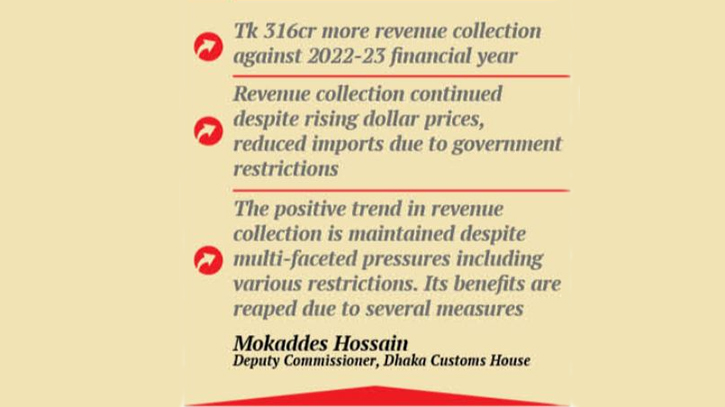
Photo : collected
Dhaka Customs House has successfully sustained its revenue collection, despite a decline in imported goods, owing to various internal reforms. These reforms include the establishment of new units, a reduction in working hours, and a meticulous determination of duties through product market verification. In the fiscal year 2022-23, the revenue amounted to Tk 1,736 crore, and in the subsequent fiscal year of 2023-24, it saw a substantial increase to Tk 2,052 crore, marking a notable rise of Tk 316 crore.
Despite challenges such as a decrease in imported goods due to factors like the appreciation of the dollar, the momentum in revenue collection has persevered. The positive results, particularly since the appointment of the new commissioner, underscore the success of the various internal reforms implemented by Dhaka Customs House.
Russell Ahmed, the spokesperson and Assistant Revenue Officer of Dhaka Custom House, proudly announced that the Custom House has achieved the top position in revenue collection targets and implementation, surpassing other custom houses. In the current fiscal year, our revenue collection has exceeded 316 crores compared to the previous fiscal year, a significant accomplishment attributed to internal measures we have implemented. Ahmed is optimistic that this positive trend will persist.
As per information from Dhaka Customs House, a series of reforms has been implemented to enhance the efficiency of revenue collection. Notably, in the airfreight (imported cargo) section, where there was previously one Deputy Commissioner, there are now two, significantly expediting the workflow. Previously, there were nine groups overseeing imported goods; currently, with the appointment of a revenue officer in each of the 19 groups, the taxation process for imported goods has become more efficient. The taxation system has also been optimised by assessing products based on their current market value, contributing to increased revenue.
Moreover, to facilitate trade, Dhaka Customs House operates two gates in the cargo complex—a commercial goods gate and an industrial goods gate. The airport, which previously operated on three shifts, has transitioned to 4 shifts, thereby reducing officers' working hours and boosting their overall enthusiasm.
To counter tax evasion and money laundering, an Anti Money Laundering Unit has been established, resulting in a noticeable reduction in attempts to evade taxes or engage in illicit financial activities.
Sources reveal a substantial increase in surveillance compared to previous periods. Instances of goods being released without proper customs clearance, which were more common in the past due to lower surveillance, have significantly diminished. This heightened vigilance has played a crucial role in sustaining the positive trend in revenue collection. Notably, these strategic decisions were implemented following the appointment of the new commissioner.
Currently, the nation is grappling with a dollar crisis, contributing to a high valuation of the dollar. The government has also imposed new restrictions on imports, leading to a reduction in product imports. Consequently, there is an expectation that the country's revenue collection from imported goods may decline. Despite these challenges, the context highlights a positive trend in revenue collection.
In the face of a decrease in imported goods, where achieving 80% of the target would be considered successful, Dhaka Custom House has surpassed expectations by achieving over 90% of their revenue collection target.
Traders acknowledge that the record revenue achieved by the customs house is undeniably positive for the country's economy, particularly during a global economic recession. They attribute this success to various initiatives implemented by customs to combat smuggling, fraud, and duty evasion.
To meet the revenue target, it is imperative to implement stringent measures to curb customs evasion through false declarations. Recent instances have exposed several shipments involved in such practices, indicating the existence of a network evading substantial revenue through deceptive declarations. Additionally, concerns have been raised about money laundering activities occurring within the import-export process.
Authorities and stakeholders share the belief that by effectively preventing these trends through strict enforcement, the pace of revenue collection can be accelerated.
Dhaka Custom House Deputy Commissioner Mokaddes Hossain stated to The Daily Messenger that despite facing numerous challenges such as the global economic recession, an ongoing dollar crisis in the country, and restrictions on the import of luxury and non-essential goods, the revenue collection at Dhaka Custom House has demonstrated a positive trend. Import figures, especially for high-duty products, are on the decline. Nevertheless, revenue collection has shown a notable increase compared to the previous year.
He emphasised that the pace of revenue collection could be further accelerated if the clearance of imported goods is expedited. Hossain stressed the importance of proactive and diligent efforts from customs officers, coupled with a commitment to honesty.
Responding to a query, he highlighted that several affirmative measures have been implemented to enhance security in airfreight and streamline customs clearance processes. The tangible benefits of these initiatives are already evident.
Hossain stated, "We have heightened the vigilance of our preventive team, implementing necessary measures to ensure that no product escapes customs duties. Our goal is to leave no room for any item to evade the rightful duties imposed.”
Messenger/Fameema








